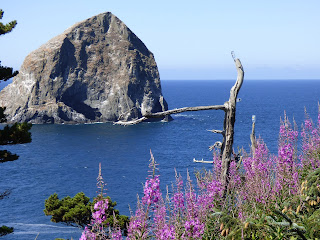But, like I said, it was a beautiful day.
The tidal flat where the BLOY was hanging out is here...
And here is the BLOY...
Try following that little black bird all the way out to that big distant rock... Then scan the rock with a scope for any sign of the disappearing bird. Give up? I did. Instead I watched a seal below me trying to position a big fish so it could be swallowed.
 |
| A fisherman friend tells me this is a Black Rockfish, also known as Seabass |
Not every day on the coast is so clear, of course. When it is hot inland (as it has been most of July), it is foggy on the coast. So it was when I monitored nests at Road's End and Cascade Head last Thursday. Every once in awhile, the nest rocks came out of the fog.
 |
| Road's End |
 |
| Cascade Head 073.1 |
And then disappeared again... There is a Black Oystercatcher in the following photo, on top of the 073.1 nest rock... right in the center of the photo. That's the guard BLOY. The nest is on the west side of that rock, totally out of view. We know because that's where the BLOY fly to and from... when we can see them.
At Short Beach, above Oceanside, far north of my other sites, the problems are more than fog and distance, although those are problems, too. The beach can only be accessed at low tide. A week ago, conditions were right and off I went.
Somewhere on that distant cliff is a BLOY nest. I knew it was there because I saw the guard BLOY fly up to a ledge, disappear, and then another reappeared in its place.
 |
| nest ledge in center of photo |
 |
| BLOY in center of photo after leaving nest |
I thought I saw a tiny spot of red on the ledge through my scope. So I took zoomed-in photos and scanned them at home on the computer. Sure enough, there was a nesting BLOY on the ledge, just left of the grassy area.
Don't believe me? Here she is, cropped and fuzzy.
She is safe from my prying eyes until the next low tide at a time of day when I can get there.
The farthest north nest I try to monitor is at Cape Meares, just beyond Short Beach. Cape Meares has been buried in fog most every day, even when the rest of the coast is clear. But last Tuesday, after I left Short Beach, it was clear, and I could see the BLOY still on her eggs. But only because I knew where to look. The north toe, where they nest, is a long way across the cove. A scope is necessary.
First, you find the little pools at the ocean end of the cove...
Then you follow the upper pool to the ridge in front of it and follow it up a short distance to a sort of level area between the two brown cliffs...
Look for nesting gulls. Look down and right from the upper gull to a boulder with two big "eyes". Well, that's what they look like to me. Your mileage may differ.
Just to the right of that boulder is a black dot with a red smaller dot on it. That's the BLOY.
 |
| BLOY is in center of photo |
Unfortunately, or fortunately, depending on the weather and my stamina, three of the original nests I monitor failed soon after eggs were laid. Since Black Oystercatchers may live twenty years if they make it through the first year, they do not need to reproduce themselves every year. Time will tell if the remaining two nests at Road's End, one at Cascade Head, one at Short Beach, one at Cape Meares, and who knows at Cape Kiwanda... will produce chicks and then fledglings.
But, as long as the weather on the coast is lovely, who cares?
















